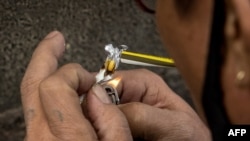A large haul of precursor chemicals in Laos since the end of last year has revealed the new recipe being used by the methamphetamine cooks of Asia and the routes crime groups are using to get raw materials from Chinese factories, through Thai ports and into the narcotics labs of the Golden Triangle.
Meth production in the region has gone into overdrive since Myanmar’s February 1 military coup unsettled the complex balance of power in the Golden Triangle, an area dominated by warlords, armed militias, gunrunners and drug traffickers, say law enforcement officials.
Laos, Myanmar and Thailand are within this mountainous corner. Laos and Myanmar share a border with China.
Thailand, the main route for Myanmar meth to the Asia-Pacific, has so far this year seized more than 300 million meth pills known as “yaba,” or crazy medicine, and nearly 20 tons of the highly addictive crystal meth, or “ice” — double last year’s haul over the same period, according to Thai drug authorities.
It is the consequence of ruptured cease-fires among Myanmar’s ethnic rebel groups as a result of the coup that ousted the government of Aung San Suu Kyi.
“Fighting in Myanmar near the drug production sites is forcing out the products at a higher volume than usual,” according to Police Major General Pornchai Charoenwong, deputy commissioner of Thailand’s Narcotics Suppression Bureau (NSB).
The drugs flow through Thailand, but then sweep out to the Asia-Pacific, officials say.
In mid-May, the Australian Border Force found 316 kilograms of ice with a street value of nearly $80 million packed inside a shipment of immersion heaters and barbecues originating from a Thai port.
But changes in production are most immediately felt by Myanmar’s neighbors.
Laos is the poor, landlocked Communist-run neighbor to Myanmar’s Shan State, where most of the meth is manufactured.
It is the key route into the Golden Triangle for precursor chemicals, as well as the main exit point for the end product — the highly addictive synthetic drugs to the Asia-Pacific market.
Authorities there recently revealed a seizure of 200 tons of precursors. The stash included 72 tons of made-in-China propionyl chloride, a new ingredient or a “pre-precursor” transported through Vietnam and captured in Bokeo, Laos, the gateway to Myanmar drug factories.
“You can only imagine the amount of drugs that volume of precursors can make,” a Laos official told VOA News on the condition of anonymity.
Curse of the precursors
The highly flammable liquid is not banned — unlike traditional meth staples ephedrine and pseudoephedrine (used in cold remedies) — and its appearance heading into the Golden Triangle shows the ability of drug networks to “shift gears,” said Jeremy Douglas, regional representative with the U.N.’s Office of Drugs and Crime.
“They have long been creative smugglers, but they are now bypassing stringent chemical controls and producing precursors using pre-precursors — not easy, and it signals sophistication and knowledge not seen elsewhere,” Douglas said.
Precursors pose a complicated cross-border challenge, with some controlled, others entirely legal in normal industrial use.
Thailand is a major entry point for the huge tonnage needed by the drug production zones but struggles to keep on top of the flow of containers full of chemicals — an issue only likely to get worse as infrastructure improves.
Drug traffickers exploit “loopholes” in customs’ laws, a Thai drug official told VOA News, requesting anonymity.
“We’re a transit point, so customs has no authority to open the container for inspection without a warrant, or at least a good reason,” the official said.
“So, these precursors are unloaded at the port onto trucks set for Laos with no problems.”
The same Thai ports — especially Laem Chabang in the eastern seaboard — are being used to move the finished product of crystal meth out to the most expensive markets.
The recent Australian meth haul was traced to a boat that left Laem Chabang.
As Myanmar slumps deeper into chaos, and armed rebel groups hunt money to stockpile guns to fight the army known as the Tatmadaw, drug experts say stemming the flow of precursors is the only way to slow drug production.
Until then, regional police fear the flow of drugs from the Golden Triangle is going to worsen, with the crime bosses at the apex of an estimated trade worth up to $60 billion a year so rich and connected they remain beyond arrest.
“You can never really take down these networks,” Montree Yimyam, commissioner of Thailand’s Narcotics Suppression Bureau, told reporters.




